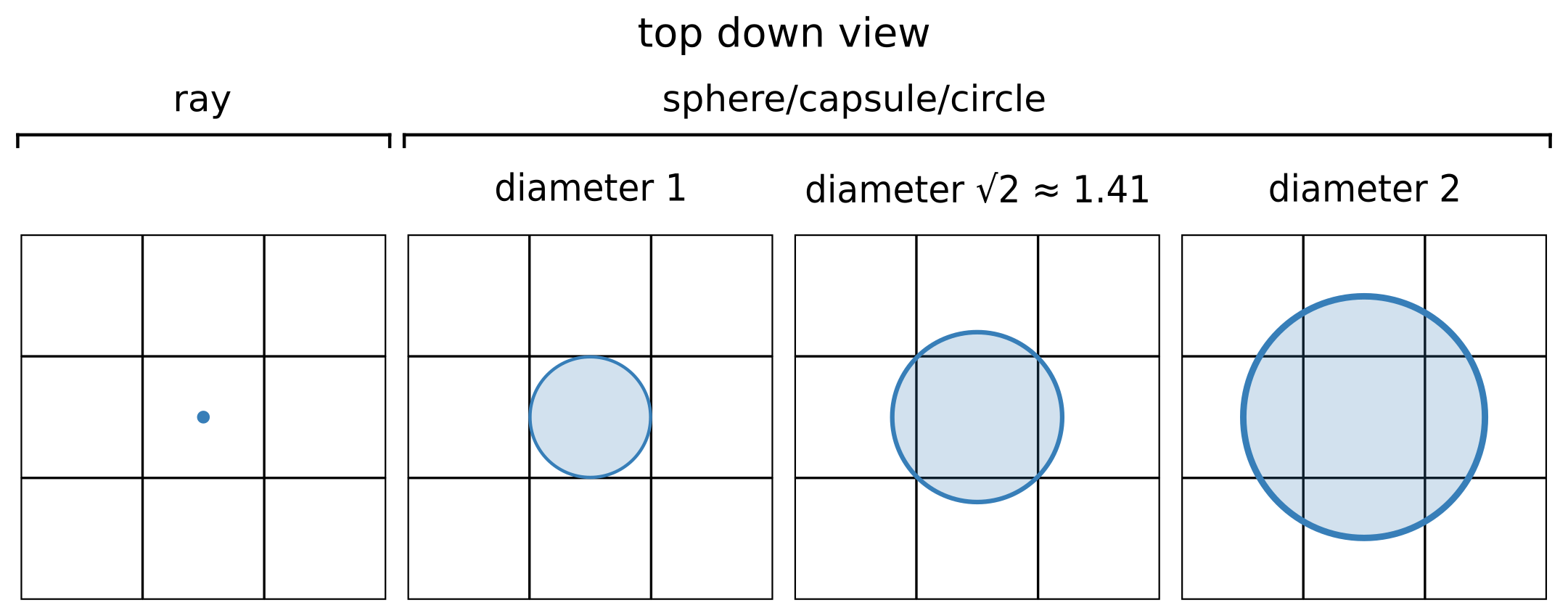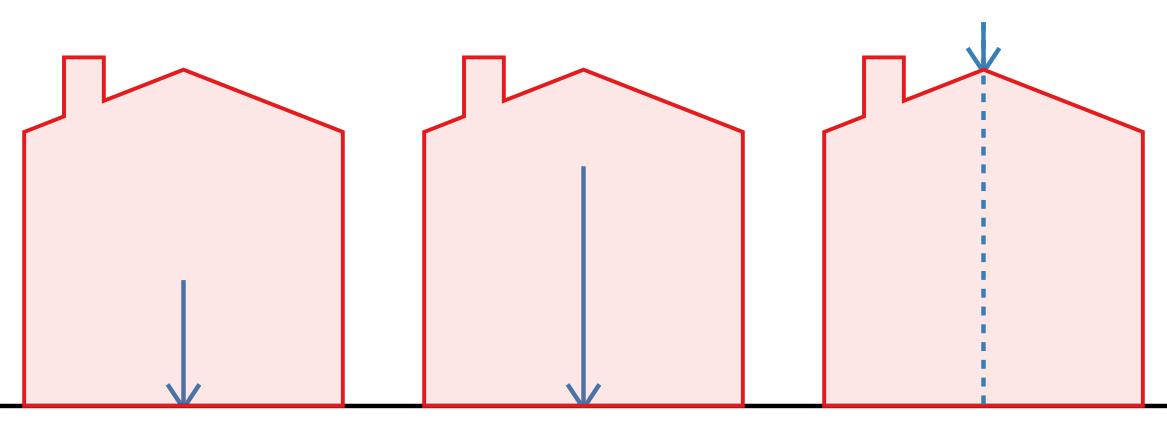Handles collision checking for graphs. More...
Detailed Description
Handles collision checking for graphs.
Mostly used by grid based graphs
Public Member Functions | |
| bool | Check (Vector3 position) |
| Returns if the position is obstructed. More... | |
| Vector3 | CheckHeight (Vector3 position) |
| Returns the position with the correct height. More... | |
| Vector3 | CheckHeight (Vector3 position, out RaycastHit hit, out bool walkable) |
| Returns the position with the correct height. More... | |
| RaycastHit [] | CheckHeightAll (Vector3 position, out int numHits) |
| Returns all hits when checking height for position. More... | |
| void | DeserializeSettingsCompatibility (GraphSerializationContext ctx) |
| void | Initialize (GraphTransform transform, float scale) |
| Sets up several variables using the specified matrix and scale. More... | |
| void | JobCollisionRay (NativeArray< Vector3 > nodePositions, NativeArray< bool > collisionCheckResult, Vector3 up, Allocator allocationMethod, JobDependencyTracker dependencyTracker) |
| Returns if the position is obstructed for all nodes using the Ray collision checking method. More... | |
Public Attributes | |
| bool | collisionCheck = true |
| Toggle collision check. More... | |
| float | collisionOffset |
| Height above the ground that collision checks should be done. More... | |
| float | diameter = 1F |
| Diameter of capsule or sphere when checking for collision. More... | |
| float | fromHeight = 100 |
| The height to check from when checking height ('ray length' in the inspector). More... | |
| float | height = 2F |
| Height of capsule or length of ray when checking for collision. More... | |
| bool | heightCheck = true |
| Toggle height check. More... | |
| LayerMask | heightMask = -1 |
| Layers to be included in the height check. More... | |
| LayerMask | mask |
| Layers to be treated as obstacles. More... | |
| const float | RaycastErrorMargin = 0.005F |
| Offset to apply after each raycast to make sure we don't hit the same point again in CheckHeightAll. More... | |
| RayDirection | rayDirection = RayDirection.Both |
| Direction of the ray when checking for collision. More... | |
| bool | thickRaycast |
| Toggles thick raycast. More... | |
| float | thickRaycastDiameter = 1 |
| Diameter of the thick raycast in nodes. More... | |
| ColliderType | type = ColliderType.Capsule |
| Collision shape to use. More... | |
| bool | unwalkableWhenNoGround = true |
| Make nodes unwalkable when no ground was found with the height raycast. More... | |
| Vector3 | up |
| Direction to use as UP. More... | |
| bool | use2D |
| Use Unity 2D Physics API. More... | |
Private Attributes | |
| float | finalRadius |
| diameter * scale * 0.5. More... | |
| float | finalRaycastRadius |
| thickRaycastDiameter * scale * 0.5. More... | |
| RaycastHit [] | hitBuffer = new RaycastHit[8] |
| Internal buffer used by CheckHeightAll. More... | |
| Vector3 | upheight |
| up * height. More... | |
Member Function Documentation
◆ Check()
| bool Check | ( | Vector3 | position | ) |
Returns if the position is obstructed.
If collisionCheck is false, this will always return true.
◆ CheckHeight() [1/2]
| Vector3 CheckHeight | ( | Vector3 | position | ) |
Returns the position with the correct height.
If heightCheck is false, this will return position.
◆ CheckHeight() [2/2]
| Vector3 CheckHeight | ( | Vector3 | position, |
| out RaycastHit | hit, | ||
| out bool | walkable | ||
| ) |
Returns the position with the correct height.
If heightCheck is false, this will return position.
walkable will be set to false if nothing was hit. The ray will check a tiny bit further than to the grids base to avoid floating point errors when the ground is exactly at the base of the grid
◆ CheckHeightAll()
| RaycastHit [] CheckHeightAll | ( | Vector3 | position, |
| out int | numHits | ||
| ) |
Returns all hits when checking height for position.
- Warning
- Does not work well with thick raycast, will only return an object a single time
- The returned array is ephermal. It will be invalidated when this method is called again. If you need persistent results you should copy it.
The returned array may be larger than the actual number of hits, the numHits out parameter indicates how many hits there actually were.
◆ DeserializeSettingsCompatibility()
| void DeserializeSettingsCompatibility | ( | GraphSerializationContext | ctx | ) |
◆ Initialize()
| void Initialize | ( | GraphTransform | transform, |
| float | scale | ||
| ) |
Sets up several variables using the specified matrix and scale.
◆ JobCollisionRay()
| void JobCollisionRay | ( | NativeArray< Vector3 > | nodePositions, |
| NativeArray< bool > | collisionCheckResult, | ||
| Vector3 | up, | ||
| Allocator | allocationMethod, | ||
| JobDependencyTracker | dependencyTracker | ||
| ) |
Returns if the position is obstructed for all nodes using the Ray collision checking method.
collisionCheckResult[i] = true if there were no obstructions, false otherwise
Member Data Documentation
◆ collisionCheck
| bool collisionCheck = true |
Toggle collision check.
◆ collisionOffset
| float collisionOffset |
Height above the ground that collision checks should be done.
For example, if the ground was found at y=0, collisionOffset = 2 type = Capsule and height = 3 then the physics system will be queried to see if there are any colliders in a capsule for which the bottom sphere that is made up of is centered at y=2 and the top sphere has its center at y=2+3=5.
If type = Sphere then the sphere's center would be at y=2 in this case.
◆ diameter
| float diameter = 1F |
Diameter of capsule or sphere when checking for collision.
When checking for collisions the system will check if any colliders overlap a specific shape at the node's position. The shape is determined by the type field.
A diameter of 1 means that the shape has a diameter equal to the node's width, or in other words it is equal to nodeSize .
If type is set to Ray, this does not affect anything.

◆ finalRadius
|
private |
◆ finalRaycastRadius
|
private |
◆ fromHeight
| float fromHeight = 100 |
The height to check from when checking height ('ray length' in the inspector).
As the image below visualizes, different ray lengths can make the ray hit different things. The distance is measured up from the graph plane.

◆ height
| float height = 2F |
Height of capsule or length of ray when checking for collision.
If type is set to Sphere, this does not affect anything.

◆ heightCheck
| bool heightCheck = true |
Toggle height check.
If false, the grid will be flat
◆ heightMask
| LayerMask heightMask = -1 |
Layers to be included in the height check.
◆ hitBuffer
|
private |
Internal buffer used by CheckHeightAll.
◆ mask
| LayerMask mask |
Layers to be treated as obstacles.
◆ RaycastErrorMargin
| const float RaycastErrorMargin = 0.005F |
Offset to apply after each raycast to make sure we don't hit the same point again in CheckHeightAll.
◆ rayDirection
| RayDirection rayDirection = RayDirection.Both |
Direction of the ray when checking for collision.
If type is not Ray, this does not affect anything
- Deprecated:
- Only the Both mode is supported now.
◆ thickRaycast
| bool thickRaycast |
Toggles thick raycast.
◆ thickRaycastDiameter
| float thickRaycastDiameter = 1 |
Diameter of the thick raycast in nodes.
1 equals nodeSize
◆ type
| ColliderType type = ColliderType.Capsule |
Collision shape to use.
- See also
- Pathfinding.ColliderType
◆ unwalkableWhenNoGround
| bool unwalkableWhenNoGround = true |
Make nodes unwalkable when no ground was found with the height raycast.
If height raycast is turned off, this doesn't affect anything.
◆ up
| Vector3 up |
Direction to use as UP.
- See also
- Initialize
◆ upheight
|
private |
- See also
- Initialize
◆ use2D
| bool use2D |
Use Unity 2D Physics API.
The documentation for this class was generated from the following file:
- /Users/arong/Unity/a-pathfinding-project/Assets/AstarPathfindingProject/Generators/Base.cs
